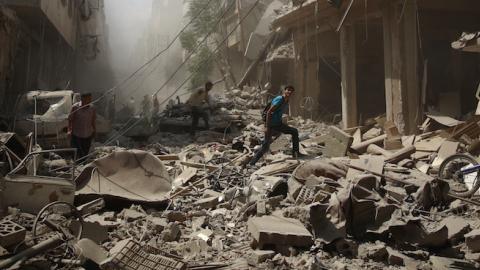It was a great year for the Obama administration’s foreign policy... says the Obama administration. The State Department even created a new hashtag to celebrate the White House's annus mirabilis—#2015in5Words. "Protecting Arctic Climate and Communities" and "Protecting Health of Our Ocean" are among two of the administration's big wins.
A few of the claims are of course questionable, like "Winning Fight Against Violent Extremists." Okay, congratulations to the White House for hosting a conference on countering violent extremism in February. But that hardly stopped the Islamic State, the world's most notorious "violent extremists," from gaining ground throughout the Middle East and North Africa, waging a major attack in Paris, and inspiring a massacre of Americans in San Bernardino last month.
Then there's "Iran Peaceful Nuclear Program Ensured." Yes, the White House went to a great deal of trouble to ink a deal with Iran—subordinating much of the rest of American foreign policy to the goal of keeping the Iranians at the negotiating table—but that hardly merits the boast. Obama himself has explained that Iran will have an industrial-scale nuclear weapons program within 15 years. In the meantime, Iran's ballistic missile tests and regional aggression suggest the deal has only fueled the Tehran regime's belligerent ambitions.
There are also egregiously false claims, like "Bringing Peace, Security to Syria." A State Department spokesman defended the claim thus: "The operative word there is 'bringing,' not brought. . . . I don't think anyone would say that we are there or across the finish line."
No, what we would say is that the administration's Syria policy has been a failure of epic proportions. The death toll in Syria over nearly five years has mounted to a quarter of a million, with more than 20,000 civilians killed in the past year alone. The vast majority of these casualties are the work of Syrian dictator Bashar al-Assad, now being propped up by Russia as well as by his Iranian patrons. This massive war has engulfed the Middle East and put Iran and Russia on the border of three important American allies, Israel, Jordan, and NATO member Turkey.
The conflict has displaced millions of Syrians, sending waves of refugees into neighboring countries and also into Europe, where the migrant crisis threatens the security and political order of America's closest partners. The fact that the continent's borders are now compromised means that a global crisis may come even closer to American shores. And in 2016 the Syrian war will almost surely get worse.
What will make the next year especially dangerous is the White House itself. Obama is eager to wrap everything up before he leaves office, and John Kerry no doubt clings to the hope that Syrian peace talks could bring him the Nobel Peace Prize he thought he earned with the Iran deal. The administration is in a hurry, and the only way it sees forward is in caving to Iranian and Russian demands—above all, the demand that Assad stay in power. Indeed, as Kerry made clear two weeks ago, the White House has finally come clean and admitted it's no longer interested in deposing Assad, if it ever was.
It's worth gaming out a few of the consequences. To begin with, the only opposition groups that can agree to a political process in which Assad is not removed are those that are in fact or in effect pro-Assad. All others will have to be excluded from peace talks, and some will be labeled terrorists, like Jaish al-Islam, one of the most effective anti-Assad units, whose leader Zahran Alloush was recently killed in a Russian airstrike. This drove home the fact that Putin's campaign was never about fighting ISIS—rather, it was about defending Assad (and securing Moscow's Syrian bases).
Therefore, in promoting a peace process that protects Assad, the White House is giving political and diplomatic cover to Moscow and Tehran. John Kerry will be acting as Putin's enforcer, telling America's traditional regional allies that the war against Assad is over and it's time to give up. If Kerry can get Turkey, Saudi Arabia, and Qatar to wave the white flag, then maybe he really is a talented diplomat. But it is very unlikely the Sunni powers will sign terms of surrender and stop supporting their chosen proxies.
Saudi Arabia can ill afford an Iranian victory of that magnitude, and it would be an even worse outcome for Turkey. Ankara is hosting millions of refugees who will never return to Syria so long as the regime that butchered their family and friends is still in power. It's a major domestic issue for the Turks, and with three unfriendly powers on its border—Russia, Iran, and Assad—the Syrian war is a national security matter. Therefore, Turkish president Recep Tayyip Erdogan believes it is vital to keep open his supply lines to anti-Assad groups, even as Putin's forces are campaigning to close them down. In other words, Kerry's "peace process" is driving a NATO member toward crisis, and perhaps a shooting war with Russia.
Israel may soon find itself in a similarly dangerous situation. Yes, even with Russian troops present in Syria, Jerusalem has continued to attack arms convoys heading across Syria to Hezbollah in Lebanon, as well as Iranian assets inside Syria, like Lebanese terrorist Samir Kuntar. However, it's not clear how long this state of affairs can last, or if the Iranians will press their Russian partners to clarify whose side they're on.
This was a bad year for American foreign policy and therefore for much of the rest of the world. Instead, of bringing peace and security to Syria, the White House has jeopardized the peace and security of our friends and partners around the world—from the eastern Mediterranean to Western Europe, and from the Persian Gulf to our own shores. What makes the administration's glib year-end self-assessment even more demoralizing is the near certainty that the White House will continue on this path, and that next year will therefore be even worse.




















